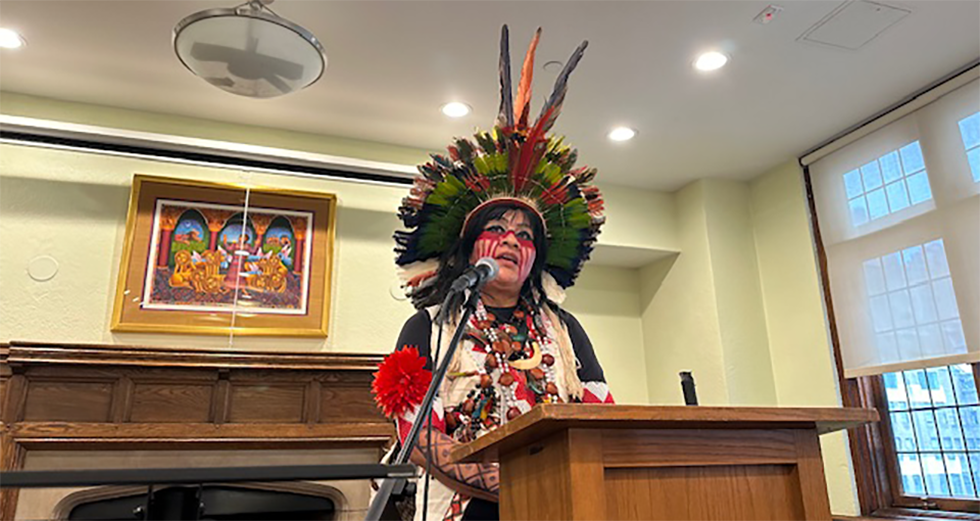Indigenous consultation issues “request to dialogue”
Posted on April 25, 2024 by Phil Tanis

Since its Uniting General Council in 2010, the World Communion of Reformed Churches (WCRC) has made commitments to Indigenous peoples that have not been realized.
A significant step toward rectifying this situation was made at a consultation of Indigenous members of the Communion and ecumenical partners in late April meeting under the theme, “Repentance, Reconciliation, and Redistributive Justice: Indigenous People’s Spirituality and Theology.”
“The consultation recognized the urgency of the situation facing Indigenous people,” said Philip Vinod Peacock, WCRC executive secretary for justice and witness. “In many parts of the world Indigenous people are being killed while in others communities they are being systematically destroyed. Global and ecumenical attention to the cause of Indigenous people is central to our commitment to justice.”
Those gathered drafted a paper to be presented to the 2025 General Council. A “request to dialogue,” the paper addresses several important topics and includes proposals for meaningful progress.
“Colonialist thought persists in Indigenous and non-Indigenous forms of governance and decision-making; its reach is profound and tenacious. All people–both inside and outside the Church–have been profoundly shaped by colonization, and it is up to all of us to decolonize and seek our collective liberation,” states the draft paper.
“Therefore, the Indigenous Peoples that have gathered together in preparation for this General Council are not submitting a position paper, so much as a request to dialogue. The WCRC and many of its member churches and other ecumenical bodies have affirmed time and again the specific and unique plight of Indigenous justice concerns across the globe, but Indigenous experience, leadership, gatherings, and ministries are never fully funded and always treated as ad hoc projects,” it says. “Through our invitation to dialogue, might we help the Church see through the ‘money’ to the JUSTICE? In our experience the Church continues ‘talking the talk’ but not ‘walking the walk’.”
In discussing the dual identities of being both Indigenous and Christian, the draft paper states, “The churches need to commit to fostering respect for all the responses Indigenous Peoples have to the challenge of balancing Christianity and Indigenous ways of being. The churches also need to commit to opening their archives and resources to Indigenous Peoples who are seeking to rebuild their expressions of faith and recover their ancestors’ stories.
“The churches must also wrestle with cases of extreme colonialism wherein Indigenous languages or knowledge are used but the theology remains Eurocentric. This is particularly true of the churches’ overemphasis on eschatology to the detriment of social justice in the here and now.”
It notes, “Across the world that God loves, Indigenous Peoples continue to live under the convergence of multiple social crises,” listing those which the Church has contributed to, but also stating that “Indigenous Peoples hold wisdom for how to minister to our communities who suffer under these overlapping social crises.”
In addressing “the climate emergency and care for God’s creation,” the draft paper states, “Indigenous Peoples are on the front lines of climate change; displacement of Indigenous communities is a result of extraction of the earth’s so called natural resources, but also through displacements directly linked to climate change.
“And so Indigenous People also continue to be the defenders of the land–standing up to corporate and governmental interests. Holding governments accountable to uphold the UN Declaration on the Rights of Indigenous Peoples, and international and domestic environmental regulations and laws. The world has an opportunity, and the Churches have a moral obligation, to actively participate in learning from Indigenous Peoples defending their lands.”
A section on the Indigenous Land Back movement and Indigenous rights states, “Indigenous rights and our assumed responsibilities are embodied and lived out in our lands. Eighty percent of the remaining biodiversity is in Indigenous traditional lands. We are what we do.”
Participants at the consultation are continuing to refine the draft which will be presented for discussion and action at the 27th General Council, to be held in Chiang Mai, Thailand, 14-23 October 2025.
The consultation was held to coincide with the Permanent Forum on Indigenous People at the United Nations in New York. It was made possible by funds from Otto per Mille and also from a special collection taken at the 2024 General Assembly at the United Church of Christ.
Category: News, Slider Tags: general council, indigenous, justice
 World Communion of Reformed Churches
World Communion of Reformed Churches